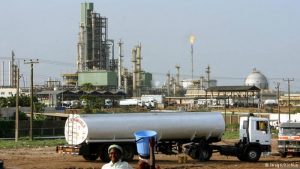
April 22, 2018//-Truck drivers found transporting diesel and petrol blended with kerosene will be banned from the road and prosecuted, the energy regulator has warned.
The Energy Regulatory Commission’s (ERC) warning comes amid increased cases of fuel contamination by unscrupulous dealers, along with diversion of fuel meant for neighbouring Uganda and Rwanda into the local market to evade taxes.
Kerosene is currently priced at Sh20 below diesel, making it a suitable blend for petroleum products for traders looking for higher profit margins.
Petroleum tanker
“Drivers of petroleum road tankers are notified that if found transporting adulterated petroleum products, diverting petroleum products destined for other markets into the local market or found having parked a petroleum tanker in an unlicensed petroleum storage facility, or proven to have driven carelessly while transporting petroleum products, they shall henceforth be banned from transporting petroleum products,” the ERC says in a notice.
Fuel adulteration causes excessive engine wear, piling undue vehicle maintenance costs on motorists while dumping in the local market products meant for landlocked markets denies the taxman revenues.
The ERC move also comes at a time when the Petroleum ministry is planning to increase kerosene prices to the level of diesel to curb the malpractice.
Lower tax
Lower tax on paraffin was originally meant to cushion low-income households that use it for lighting and cooking from high cost of living but profit-hungry traders have turned it into a cash cow that earns them millions of shillings.
The government takes a total of Sh8.42 in taxes from every litre of kerosene sold at the fuel pump, making it the least taxed fuel, in comparison to petrol, taxed at the rate of Sh39.17 per litre, and diesel Sh29.57.
It is this price difference that has encouraged blending of diesel and petrol with paraffin to increase profit margins.
Kenya in 2010 started controlling the maximum price of petrol, diesel and kerosene, limiting oil dealers’ avenues for raking in larger profits to higher sale volumes and cost management.
businessdailyafrica.com


